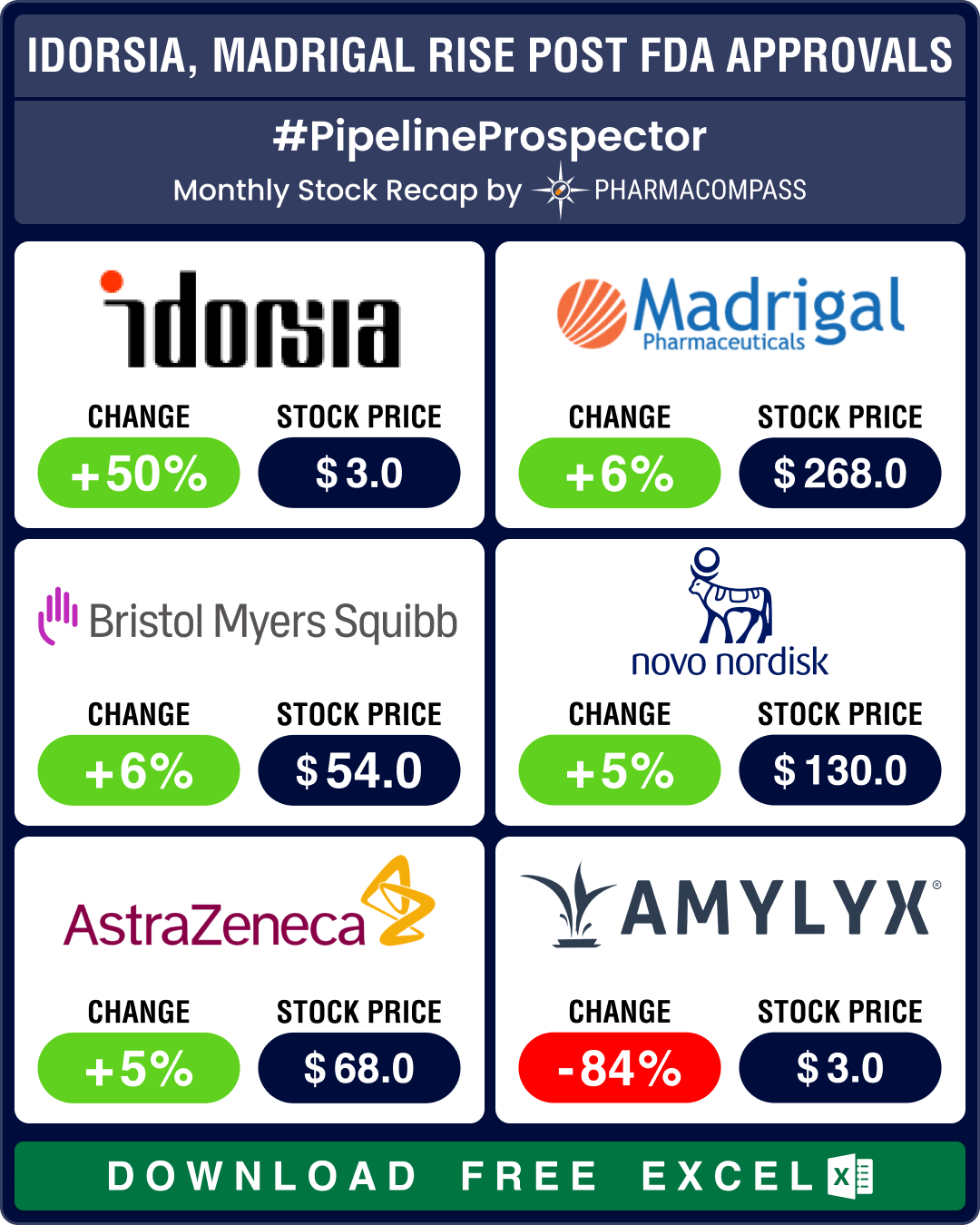
By PharmaCompass
2024-04-04
Impressions: 2524
March was clearly a month of drug approvals, as the US Food and Drug Administration (FDA) went on an overdrive, green-lighting several therapies before the close of the first quarter (Q1 2024). Amongst them was the first drug to treat non-alcoholic steatohepatitis (NASH) and a breakthrough therapy that treats pulmonary arterial hypertension (PAH).
However, the buoyancy in drug approvals didn’t play out in the stock markets and most pharma indices witnessed a marginal dip. The Nasdaq Biotechnology index (NBI) fell marginally (-0.43 percent) to 4,429.97 from 4,449. The SPDR S&P Biotech ETF index (XBI) dropped 4.6 percent to 94.89 after ending February at 99.44. And the S&P Biotechnology Select Industry index (SPSIBI) was down by 3.4 percent from 7,662.14 to 7,402.47 in March.
In deals, AstraZeneca bought two companies, shoring up its cancer and rare disease pipelines. The Anglo-Swedish drugmaker first bought France’s Amolyt, which focuses on rare endocrine diseases, for a total of US$ 1.05 billion and then acquired next-generation cancer drugmaker Fusion Pharmaceuticals for around US$ 2 billion. AstraZeneca’s stock was up 4.6 percent in March. Novo Nordisk (stock up 4.8 percent) agreed to acquire Cardior Pharmaceuticals for up to US$ 1.1 billion in order to boost its pipeline for cardiovascular diseases.
Access the Pipeline Prospector Dashboard for March 2024 Newsmakers (Free Excel)
FDA okays first drug for NASH; Wegovy approved as med to reduce heart risks
For quite some time, the drug development field for the liver condition non-alcoholic steatohepatitis (NASH) has been a graveyard for failed programs. In March, the field celebrated a hurrah moment when Madrigal Pharmaceuticals (stock up 6 percent) won the race to have the first NASH treatment approved by the FDA.
Madrigal’s oral drug Rezdiffra (resmetirom) treats adults with NASH, a disease that causes histologic liver damage and occurs in patients who are not alcoholics and are often obese or have type 2 diabetes. The approval has opened a multi-billion dollar opportunity for Madrigal.
The GLP-1 agonist drugs that are used to treat diabetes and obesity have shown heart-related benefits too in clinical trials. Last month, FDA approved Novo Nordisk’s Wegovy (semaglutide) to reduce the risk of cardiovascular death, heart attack, and stroke in obese or overweight adults with cardiovascular disease (CVD). The move makes Wegovy the first weight-loss medication that is also approved to help prevent life-threatening cardiovascular events. The approval was hailed as a major advancement in public health.
Another significant FDA approval was granted to Akebia’s anemia drug, vadadustat. After being turned down in March 2022, Akebia has now been approved to treat anemia caused by chronic kidney disease (CKD) in dialysis patients.
Access the Pipeline Prospector Dashboard for March 2024 Newsmakers (Free Excel)
FDA okays two meds for PAH; Italfarmaco’s Duvyzat approved for DMD
FDA approved a breakthrough therapy from Merck, known as Winrevair (sotatercept-csrk), to treat adults with hypertension that is caused by constriction of the arteries in the lungs, known as pulmonary arterial hypertension (PAH). The agency also approved Johnson & Johnson’s Opsynvi – a single-tablet combination of macitentan and tadalafil – for the chronic treatment of adults with PAH. With this approval, Opsynvi became the only once-daily combination therapy for PAH.
Apart from PAH, there was another significant approval for hypertension. FDA okayed Idorsia’s once-daily treatment Tryvio (aprocitentan) in combination with other antihypertensive drugs, to lower blood pressure in adult patients who are not able to adequately control their BP on other drugs. Idorsia’s stock was up 50 percent in March. Tryvio is the first oral anti-hypertensive therapy, which works via a new therapeutic pathway, to be approved in almost 40 years.
The US agency also approved Italfarmaco Group’s oral medication Duvyzat (givinostat) for the treatment of Duchenne muscular dystrophy (DMD) in patients six years of age and older. Duvyzat is the first nonsteroidal drug approved to treat patients with all variants of DMD, a genetic disorder characterized by progressive muscle degeneration.
Orchard Therapeutics’ Lenmeldy was also greenlit by the FDA as the first gene therapy in the US for a debilitating and rare pediatric disorder, known as metachromatic leukodystrophy (MLD).
Access the Pipeline Prospector Dashboard for March 2024 Newsmakers (Free Excel)
Breyanzi okayed for complex leukemia; Tevimbra approved for esophageal cancer
Among cancer treatments, FDA granted an accelerated approval to BMS’ Breyanzi, making it the first and only CAR-T cell therapy for adults with relapsed or refractory chronic lymphocytic leukemia (CLL) or small lymphocytic lymphoma (SLL). BMS’ stock was up 6 percent in March.
BeiGene’s PD-1 blocker Tevimbra (tislelizumab) finally got the go ahead from the FDA as a treatment for adult patients with unresectable or metastatic esophageal squamous cell carcinoma (ESCC) after prior systemic chemotherapy that did not include a PD-(L)1 inhibitor.
FDA also granted accelerated approval to Takeda’s Iclusig (ponatinib) to be used with chemotherapy for newly diagnosed patients with Philadelphia chromosome-positive acute lymphoblastic leukemia (Ph+ ALL), a type of blood cancer of the bone marrow and blood.
Access the Pipeline Prospector Dashboard for March 2024 Newsmakers (Free Excel)
Pfizer-Takeda’s Adcetris posts trial win in DLBCL; FDA defers donanemab approval
In clinical trials, there was some positive news from a phase 3 trial on Pfizer and Takeda’s drug Adcetris, which is known as a standard of care in classical Hodgkin lymphoma. The med has now shown to be efficacious in diffuse large B-cell lymphoma (DLBCL), a common type of non-Hodgkin lymphoma, when used in combination with two other drugs — lenalidomide and rituximab.
In a late-stage trial, Novo Nordisk’s broadly used blockbuster diabetes drug Ozempic (semaglutide) slashed the risk of kidney disease progression and death from cardiovascular or kidney complications by 24 percent in diabetic patients with CKD.
In negative news from the trials, the much anticipated approval of Eli Lilly’s donanemab scheduled for March was deferred as FDA opted to convene a panel of independent experts to assess the drug’s safety and efficacy. Similarly, Amylyx’s Relyvrio (sodium phenylbutyrate and taurursodiol), a promising investigational treatment for amyotrophic lateral sclerosis (ALS), or Lou Gehrig’s disease, failed to demonstrate it works better than a placebo in a 48-week long trial. ALS is a fatal motor neuron disease characterized by progressive degeneration of nerve cells.
Access the Pipeline Prospector Dashboard for March 2024 Newsmakers (Free Excel)
Our view
With so many drug approvals, March was a good month for the biopharma industry. While it may look like the markets didn’t cheer the approvals, all the three indices — the NBI, XBI, and SPSIBI — ended the quarter in the green, growing 2.1 percent, 7.3 percent, and 6.4 percent, respectively, between January 2 and March 28. As we enter the second quarter of 2024, we hope the buoyancy in drug approvals and the indices is maintained.
Access the Pipeline Prospector Dashboard for March 2024 Newsmakers (Free Excel)
Pharma & Biotech Newsmakers in March 2024
| Company | Country | Currency | Market Cap (Bn) | Change In Market Cap (M) | Stock Price | Change In Price |
|---|
The PharmaCompass Newsletter – Sign Up, Stay Ahead
Feedback, help us to improve. Click here
Image Credit : Pharma & Biotech Newsmakers in March 2024 by PharmaCompass license under CC BY 2.0
“ The article is based on the information available in public and which the author believes to be true. The author is not disseminating any information, which the author believes or knows, is confidential or in conflict with the privacy of any person. The views expressed or information supplied through this article is mere opinion and observation of the author. The author does not intend to defame, insult or, cause loss or damage to anyone, in any manner, through this article.”







